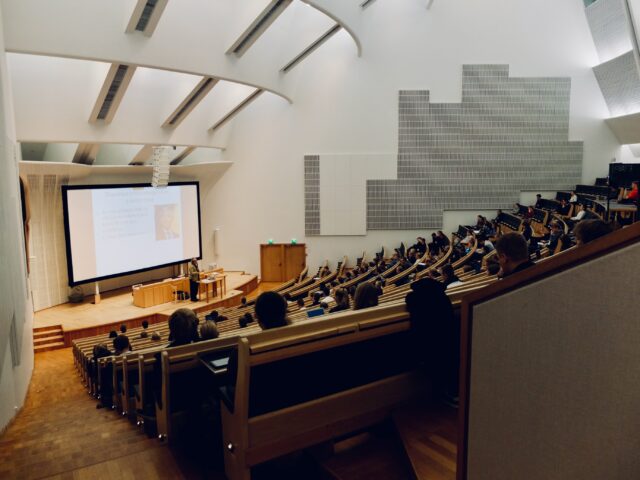The Université de Sudbury is planning to welcome a new cohort of students to campus this Fall, which would be the university’s first cohort of students since Laurentian University ended its affiliation with the institution. CBC reports that the university plans to offer more than 30 programs and program options in the Fall across fields such as health sciences, social sciences, and business administration. The Sudbury Star reports that USudbury is working with the Government of Ontario and postsecondary partners to restore its designation under the French Language Services Act. CBC adds that USudbury is also working with ON on a funding agreement and has a partnership with the University of Ottawa that would allow for flow-through funding.

Top Ten News
January 10, 2025
Kwantlen Polytechnic University has launched KPU Flex, an initiative that introduces more flexible learning pathways. KPU Flex is designed to shorten the time it takes to complete a postsecondary program by recognizing prior learning and competencies. Applicants will submit portfolios or complete interviews for assessment to demonstrate their competencies. KPU Flex is currently available for programs in the KPU Melville School of Business, as well as the Diploma in Brewing and Brewery Operations. The initiative will be expanded to include other credentials in the future.
Université du Québec à Montréal has launched the “Révélez votre potential” campaign, which includes a new micro-site about UQAM and a series of videos and ads that feature the student experience. The micro-site includes statistics, program information, and student testimonials about studying at UQAM. The ad campaign features eight undergraduate students, who each share about their life on campus, discuss what inspires them, and share information about their studies. The campaign will appear in a variety of locations, such as on digital platforms, in cégeps, and on television.
The University of Saskatchewan will receive over $1M over the next five years to support the USask Chair in Swine Welfare. The funding comes from 14 partners who work in the pork industry, including producers, processors, and veterinarians. USask Western College of Veterinary Medicine (WCVM) Associate Professor Dr Yolande Seddon will continue to provide leadership in swine welfare research and industry expertise as the renewed chair. “Renewed industry support means Dr Seddon and her team have the resources they need for continued research momentum to scientifically assess key questions about swine behaviour and welfare, to help the industry develop practical solutions, and to play a vital role in shaping the future of swine production,” said WCVM Dean Dr Gillian.
Concordia University’s Loyola College for Diversity and Sustainability (LCDS) is launching the Microprogram in Sustainability Principles. Students in the program will complete five courses in person or online, including one course each from three categories: Environmental Sustainability, Sustainability Policy, and Sustainability Values. The program will help round out the LCDS’s existing minor and elective group offerings. It is open to all Canadian citizens and permanent residents regardless of their previous education. “With sustainability issues arguably affecting all of humanity, Concordia is providing relevant education to better equip people to make informed decisions in their own lives, as well as locally, regionally and globally,” said Concordia LCDS Coordinator Rebecca Tittler.
Seneca Polytechnic has received $660K from RBC Future Launch to help Canadian youth prepare for a nursing career and, in turn, bolster the health-care sector. The Seneca Nanji Foundation School of Nursing will use the funds to support four priority areas: leveraging AI technology to support interview and communication skills development, introducing a full-time Career Navigator, creating a stipend for students in the nursing fast-track program, and retrofitting Seneca’s labs and simulation suites. These efforts are intended to improve student retention and increase the number of nursing graduates entering the workforce.
According to a recent CBC survey, over 40% of newcomers—including international graduates—would consider leaving Canada if given the choice. Respondents noted that newcomers struggled with challenges such as homesickness, discrimination, and housing and work. “Canada is not the land of opportunity anymore,” said University of Calgary graduate Ali Quina, who is considering returning home to the Philippines when her post-graduation work permit expires. UCalgary School of Public Policy Research Fellow Robert Falconer commented that “we’re very likely to see an increase in the out-migration of international students, of temporary foreign workers, et cetera” in the future, due to the restrictions implemented by the federal government.
The University of Guelph is responding to a cluster of gastroenteritis cases occurring in its residences. As of Thursday afternoon, there were approximately 150 self-reported cases, primarily in the university’s South Residence. The university said that it has paused larger-scale social programs to stop the spread. It has also partnered with Wellington-Dufferin-Guelph Public Health to inform its next steps and shared some of the actions that the Student Housing Services team and Custodial Services are taking to contain the illness. Students and resident advisors have been provided with instructions on how to prevent the spread and what to do if they are feeling ill.
Universities must do a better job preparing academics for retirement, argues Harvey J Graff (Ohio State University). Graff writes that while retirement can be intellectually, psychologically, and financially difficult for professors due to poor preparation or a strong psychological identification with their work, institutions rarely offer retirement guidance. Graff encourages universities to support professors as they near retirement by sharing advice in the form of books or conference sessions to help with these transitions or by creating systems that allow professors to gradually step away from their duties as they transition into retirement. “The need is urgent and increasing given the political economy of universities around the world and the rising crises of the diminishing professoriate,” underlines Graff.
The University of Manitoba has shared the results of the communication protocols review that it launched last Fall following an unsubstantiated report of an armed person on campus. The review identified opportunities for improvement in three areas: communications, education, and infrastructure. Recommendations include increasing the adoption of the institution’s safety app, finding ways to expedite communication during an emergency, offering training in partnership with the Winnipeg Police Service, and updating the institution’s CCTV system. UManitoba added that several recommendations have either already been implemented across campus or are planned for 2025.
